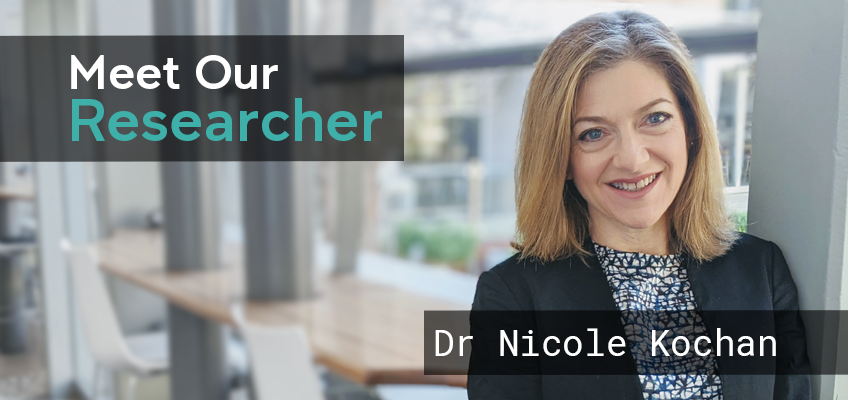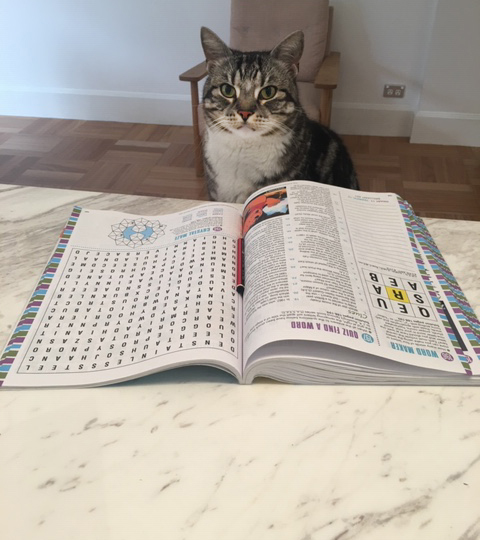26 Nov 2020

Dr Nicole Kochan is the leader of CHeBA’s Neuropsychology Group and plays a key role in the development and progress of CHeBA’s largest longitudinal cohort study, the Sydney Memory and Ageing Study. Dr Kochan is assessing the validity and efficacy of computer-based neuropsychological tests to detect cognitive decline and potentially provide a more accessible, time efficient and cost-effective means of assessing cognitive function in older adults.
How did you first get into research?
I am a trained Clinical Neuropsychologist and was working for several years at the Prince of Wales Hospital Memory Clinic with CHeBA’s Co-Directors, Professor Perminder Sachdev and Professor Henry Brodaty. At this time, the Co-Directors asked me to assist them to develop a pilot study looking at cognitive health of older adults in the community. This pilot study - which started in 2004 - morphed into the Sydney Memory and Aging Study, which is CHeBA’s largest longitudinal study. We have over 1000 participants aged 70 and older in this study which remains ongoing 15 years later. My interest in research grew from there and now I am leading CHeBA’s Neuropsychology Group. I am involved in numerous highly impactful research projects with some very gifted researchers and students from diverse fields who all have a common interest in furthering our understanding of healthy cognitive ageing, and the neurodegenerative disorders associated with ageing, including dementia.
Did you experience a ‘defining moment’ which led you to this field?
For me, it was more of a growing realisation through my clinical work, particularly that we needed to improve our methods of diagnosing dementia for patients presenting with concerns about their memory. I wanted to develop more accurate and efficient methods of assessing memory and other cognitive functions to facilitate diagnosis of dementia at the earliest stages. As an experienced neuropsychologist, I felt this was an area of research I was well qualified to develop.
Many patients presenting to their doctor with early symptoms are aware of their difficulties and are fearful about cognitive deterioration. They wonder if they are experiencing Alzheimer’s disease.
Receiving a diagnosis can be hard, but many people just want to know so they can take some course of action, such as investigating treatment options or interventions that may slow progression, or accessing services to support them. Many patients wish to make plans for their future, organise finances, even take a trip or reconnect with family and friends while they are still relatively cognitively well.
It is important to develop the best methods to determine whether they have early cognitive impairment – as well as the cause - in order to be able to give an accurate prognosis. For example, testing may identify potentially treatable and reversible conditions with dementia-like symptoms such as Vitamin B12 deficiency or thyroid dysfunction. There will also be people who will find out they are cognitively healthy, and this will understandably alleviate their concerns.

Do you have any personal interests or activities which are protective behaviours against cognitive decline?
I am really quite a health conscious person; I want to have a healthy heart and healthy brain for the long run. Pretty much everything you do for your heart is also going to support your brain health. I love exercising and I love variety and as such I try to mix it up every day of the week. I happily exercise six days a week and my rest day is a walk with my brother. I run, do Pilates, take a spin or barre class, and enjoy circuit training. I really love all that. In terms of my dietary intake I try to eat a healthy Mediterranean-based diet. I am trying to reduce my sugar intake but this has been a bit challenging during the pandemic. In terms of complex brain activity, which is considered protective against cognitive decline, I feel that my research work is constantly stimulating my brain! Any mental activity that is reasonably complex, is novel, is challenging and enjoyable is all considered positive for brain health. I have given many talks on the factors for better brain health, particularly focusing on maximising memory and mental stimulation. I also maintain a strong social network which is protective for brain health and I enjoy helping my daughter who is obsessed with crosswords and other word puzzles. We recently completed our first 1000-piece jigsaw!
What are you currently researching?
I am researching the suitability of using computerised cognitive tests with older adults. There is a growing number of tests that are on the market and some claim to diagnose cognitive impairment and dementia, but we have relatively little information on how reliable and accurate these new tests are, and who they are suitable for. In the CogSCAN study we are examining four of the most prominent instruments in the field and comparing them on several important characteristics. One potential concern is that some older adults, unlike the younger generations, are not using computers on a regular basis and may have low confidence in their abilities, given computers were not around in their formative years. Firstly, we need to know whether their attitudes to computers and technology and their level of experience with computers and other devices influence how they perform on the tests. Another key area of investigation is how usable and enjoyable these computerised tests are so that we can see whether people will actually be happy to do them. Of course, one of the most important things to establish is whether these tests measure up well against gold standard neuropsychological tests that we have been using up until now. Related to this, I am supervising a PhD student, Zara Page who is investigating whether computerised measures or traditional neuropsychological tests are more suitable for use with individuals who come from other linguistic and cultural backgrounds. The COVID-19 pandemic has had a huge impact on our community’s health, the economy, the way we live our lives and also on our research at UNSW. This new challenge has motivated me to adapt my research and think about other ways we can provide neuropsychological assessments now and into the future. Together with my team, we have developed CogSCAN at Home to investigate computerised cognitive tests delivered over the internet in people’s homes. Little research has been done so far using this platform with older adults so we are very excited to be engaged in this cutting-edge research.
Why is your research important?
Currently, in Australia, we lack adequate resources to meet the high demands for specialist diagnostic services for dementia, and the situation is far worse outside of metropolitan areas. This means that many people are missing out on obtaining a timely diagnosis of dementia at an early stage of the disease when access to clinical drug trials and cognitive health interventions is most beneficial.
If computerised cognitive testing proves to be a useful cognitive screening tool, this will ensure that people who are at greatest risk of dementia could be prioritised for specialist diagnosis and channelled into appropriate treatments and services.
Computerised cognitive tests could potentially be done in the doctor’s surgery as part of an annual health check or even self-administered at home to enable a person’s cognitive function to be monitored. This would be a very efficient way of doing it, at relative low cost and more accessible to older adults who are concerned about their memory. I hope that the findings from the CogSCAN study will have a significant impact on how older Australians receive assessments of their cognitive functioning in the future.
What do you love about working for CHeBA?
I love working at CHeBA and have been here for sixteen years! Over this time, I have had the opportunity to work with so many bright, enthusiastic, talented researchers and students. This has really stretched my experience in terms of collaborating with researchers from such diverse fields as neuroimaging, genetics, proteomics, falls research, and computer engineering. I am very fortunate to have had so many opportunities to work on many different projects and with researchers from other Australian and international research centres. I am also extremely proud of the work my wonderful CogSCAN team are doing: Karen Croot, Karen Allison, Min Yee Ong, Matilda Rossie, Jessica Turner, Julia Riches, Zara Page and Sophia Xi.
What is the ultimate hope you have for your research?
My hope is that through this research, we will identify sensitive and accurate cognitive tests to facilitate early diagnosis by detecting subtle cognitive changes at the very early stage before clinical symptoms of dementia have become apparent. Hopefully, this testing will not be too burdensome on individuals and will be quick and efficient. I would like to see computerised testing become widely available to people and that it could potentially be part of an annual GP check-up in conjunction with blood tests, blood pressure, weight etc. My vision is that older adults will be able to sit down and do a number of these computerised cognitive tests to monitor their cognition and alert the doctor to any issues that need attention.
This interview was undertaken during the COVID-19 self-isolation period. Dr Nicole Kochan found staying physically and mentally active and completing mentally challenging puzzles with daughter Jami supported her mental resilience during the last eight months of the pandemic.
Donations are fundamental for critical research to continue following COVID-19.
If you would like to discuss supporting Dr Kochan's work specifically, or would like information
on leaving a legacy via a Gift in your Will, please contact h.douglass@unsw.edu.au.

Dr Nicole Kochan is a Senior Research Fellow at CHeBA and a Clinical Neuropsychologist. She is the Principal Investigator of the NHMRC funded CogSCAN project, and the Leader of CHeBA’s Neuropsychology Group. Dr Kochan is a core member of the investigator team of two of CHeBA’s cohort studies – the Sydney Memory and Ageing Study and the Sydney Centenarian Study, and also provides her neuropsychological expertise to CHeBA’s international consortia studies including STROKOG, ICC-Dementia, and COSMIC, and the Australian Dementia Network (ADNeT) -Memory Clinics Initiative. She completed a Master of Clinical Neuropsychology at Macquarie University, her PhD in the School of Psychiatry, University of New South Wales, and received the NHMRC Early Career Research Fellowship in 2012. In her spare time, Dr Kochan enjoys completing puzzles and crosswords with her daughter Jami, an activity which also supports cognitive agility and can help our efforts to preserve brain function as we age.
